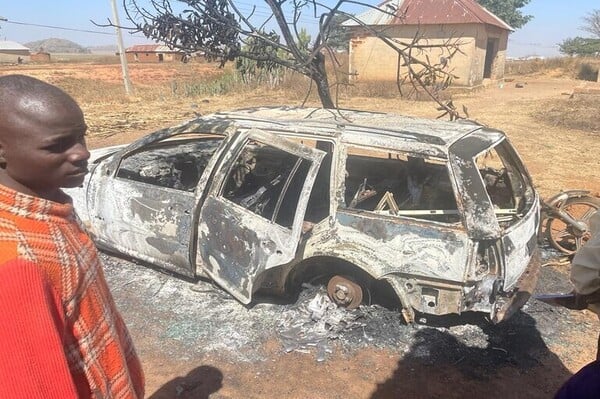A new attack by Fulani Muslim bandits has caused displacement and despair among Nigeria’s Christians, and their government is failing to respond.
During the Christmas holidays, terrorists caused death and destruction in the Christian communities of Bokkos, Barkin Ladi and Mangu in Plateau State, central Nigeria. Nearly 170 people have been confirmed dead and the death toll is likely to rise. Father Andrew Dewan is the director of communications for the diocese of Pankshin, where the attacks took place. He spoke to Aid to the Church in Need about the coordinated attacks on 26 villages that began on December 23 and did not end until December 26.
Initial reports indicate that around 170 people were killed in this latest violent episode. Can you confirm these figures?
I can. So far there are 164 or 167 deaths, but this figure will definitely increase, because there are many people in hospital, injured to varying degrees.
Are the victims all Christians or were the attacks carried out indiscriminately?
These unprovoked attacks were well coordinated and deliberate, specifically targeting Christian communities. I can confirm that the victims are 100 percent Christian.
You’re talking about well-coordinated attacks. How did the terrorists operate?
This violence began at night, in the rural community of Mushu. Around 18 people were killed and several others were injured.
As people tried to understand what happened in Mushu, Tudun Mazat was attacked. The attackers stormed the community in the evening, when most people were eating dinner and those who had finished were visiting friends. Before people could raise the alarm, the bandits were already upon them. People were summarily shot, and homes, harvested corn, churches and clinics were all burned. I had gone to this same community for Christmas mass that morning. And from Tudun Mazat, Fulani terrorists attacked Maiyanga, killing 13 people. Around 20 other communities were attacked that night.


Do you know the identity and motivations of the attackers?
Survivors and eyewitnesses categorically stated that they were Fulani militiamen or mercenaries. In communities where Christians live alongside Fulani, no Fulani has been affected and no Fulani house has been burned. There is therefore no doubt that the attackers were Fulani.
As for the motive, I am not sure, but it could be linked to the attacks that took place in the neighboring area, Mangu. The Fulani attacked the communities there and they expected Christians from neighboring communities to allow them access, but they refused. I think they came back to attack because of that.
These attacks have a long history. Fulani pastoralists, or herders, originate from the Sahel region, the northern corridor of Africa, and there were pastures for the herders, but which are now desert. Thus, the Fulani and their livestock moved south to greener pastures in the Middle Belt region, where attacks took place continually. To freely access these pastures, they would have to dispossess the natives, who are Christians.
It’s a competition for land. The natives will sometimes prevent the Fulani, if they clearly see that they want to attack the communities. And the Fulani, because of this resistance, attack them. I think that’s what happened in this case.
Did the fact that it was Christmas also contribute, or was it a coincidence?
For those who believe this conflict is not religious, this latest attack proves that it is clearly a religious conflict. The fact that this took place at Christmas – and was deliberately targeted at Christians in a mixed community, where Muslims were not attacked – clearly bears all the hallmarks of a religious conflict. I know not everyone likes to admit it, but to me, having been on the ground, observing and writing about it, it bears the hallmarks of religious conflict.
The attacks were deliberate and also symbolic because of the timing. Rumors were circulating in the mainstream media and on social media that the Fulani were going to attack and that the aim was to inflict maximum suffering and destruction on the Christians. Many of us had ignored it, but the attention of the security forces was drawn, although, as always, nothing was done until the tragedy occurred.
Victims of these attacks in Nigeria often complain about the lack of response from security forces. Do you have the same complaint?
I do. I have read reports that suggest that the military and security forces are complicit in this, because if they were really up to it, they should have been gathering intelligence, because, as I said, there was had rumors, including times they were going to attack. This should have put security on red alert, but, as is often the case, they were taken by surprise.
What have political leaders done?
We are dealing with absentee leaders. Our leaders do not live in the community and therefore do not understand the problems affecting the people. We are reaching the point where, if nothing drastic is done to deal with this coming storm, the possibility of people taking the law into their own hands is very high.
Many people must turn to you for comfort and spiritual support. How important is your role to the community today?
This is a real challenge right now, as we face a huge deluge of internally displaced people. Christians from villages flocked to city centers for shelter, food and clothing, at a time when the weather was very cold, comparable to that of Europe at that time. Due to the lack of an official response, churches are often forced to respond to such emergency situations. Hundreds of displaced people are seen in Church compounds, and the Church has to provide them with food, clothing and financial resources. The current situation is indeed disastrous.
Although some Christians disillusioned by these unprovoked attacks are now tempted to return to traditional African religions, the vast majority draw inspiration from the Scriptures and the life of the early Church.
—Filipe d’Avillez


